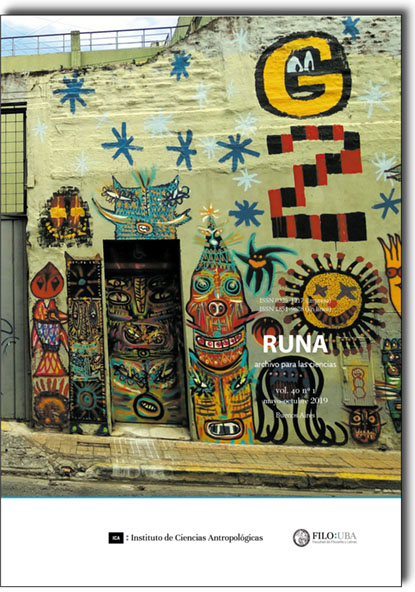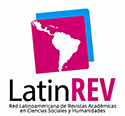Beyond children’s agency and cultures. Insights from an ethnographic research with mapuche children
Abstract
The field of social studies on childhood has clearly developed and broaden in the last decades, through a reconceptualization of childhood as a sociocultural construction, with an emphasis on children’s active participation in social life, especially among scholars from the core countries who have spread the concept of “childhood agency” and “children’s cultures”. In this paper I analyze the assumptions and risks implied in the ways such categories are being used, drawing from my research with Mapuche indigenous children in the province of Neuquén, carried out since 2001. By contrasting this two powerfull concepts for marginalizaed theoretical and indigenous perspectives, I will argue for an approach that contextualices children’s agency and children’s cultural production in sociohistorical and cultural terms, within intergenerational and interethnic power relations, and those of class and gender.Downloads
References
Ariès, P. (1987 [1960]). El niño y la vida familiar en el Antiguo Régimen. Madrid: Taurus.
Bourdieu, P. (1997). Razones prácticas. Sobre la teoría de la acción. Barcelona: Anagrama.
Bourdieu. P. (1999). La miseria del mundo. Buenos Aires: Fondo de Cultura Económica.
Briones, C. (2008). Diversidad cultural e interculturalidad: ¿de qué estamos hablando? En C. García Vázquez (Comp.). Hegemonía e interculturalidad. Poblaciones originarias y migrantes. La interculturalidad como uno de los desafíos del siglo XXI (pp. 35-58). Buenos Aires: Prometeo.
Brow, J. (1990). Notes in community, hegemony, and the uses of the past. Anthropological Quarterly, 63, 1-6.
Caputo, V. (1995). Anthropology’s silent “others”: A consideration of some conceptual and methodological issues for the study of youth and children’s cultures. En V. Amit-Talai y H. Wulff (eds.), Youth Cultures. A cross cultural perspective (pp. 19-42). Londres: Routledge.
Cohn, C. (2005). Antropologia da Criança. Río de Janeiro: Jorge Zahar.
Course, M. (2007). Death, Biography, and the Mapuche Person. Ethnos, 72(1), 77-101.
Evans-Pritchard, E. (1977). Los nuer, Barcelona, Anagrama.
Fonseca, C. (1999). O abandono da razão: A descolonização dos discursos sobre a infância e a família. En E. A. L. de Souza (Org.). Psicanálise e colonização: leituras do sintoma social no Brasil (pp. 255-274). Porto Alegre: Artes Médicas.
Fonseca, C., Medaets, C. y F. Bittencourt Ribeiro (Orgs.) (2018). Prefacio. En Pesquisas sobre Família e Infância no Mundo Contemporâneo (pp.7-20). Porto Alegre: Sulina.
García Canclini, N. (2004). Diferentes, desiguales y desconectados. Mapas de la interculturalidad. Barcelona: Gedisa.
García Palacios, M., Enriz, N. y Hecht, A. C. (2014). Niños y niñas en las fuentes etnográficas sobre poblaciones indígenas (qom-mbya). Papeles de Trabajo, 28, 61-78. Recuperado de http://www.scielo.org.ar/scielo.php?script=sci_arttext&pid=S1852-45082014000200004
Giddens, A. (1987). Las nuevas reglas del método sociológico. Buenos Aires: Amorrortu.
Hecht, A. C. (2010). Todavía no se hallaron hablar en idioma. Procesos de socialización lingüística de los niños en el barrio toba de Derqui (Argentina). Munich: Academic Publications.
Hirschfeld, L.A. (2002). Why Don’t Anthropologists Like Children? American Anthropologist, 104, 611-627.
James, A. (2007). Giving voice to children’s voices: Practices and problems, pitfalls and potentials. American Anthropologist, 109(2), 261-272.
Jenks, C. (1996). Childhood. Londres: Routledge.
Lancy, D. (2012). Unmasking children’s agency. AnthropoChildren, 2, 1-20.
Lutz, B. (2007). Estructura y sujeto: Perspectivas teóricas desde las ciencias sociales. Cinta Moebio, 29, 155-166. Recuperado de http://www.facso.uchile.cl/publicaciones/moebio/29/lutz.pdf
Magistris, G. (2018). La construcción del “niño como sujeto de derechos” y la agencia infantil en cuestión. Journal de Ciencias Sociales, 11, 6-28. Recuperado de https://dspace.palermo.edu/ojs/index.php/jcs/article/view/819/736
Murray, M., Bowen, S., Segura, N. y Verdugo, M. (2015). Apprehending Volition in Early Socialization: Raising “Little Persons” among Rural Mapuche Families. Ethos, 43(4), 376-401.
Novaro, G. (2012). Niños inmigrantes en Argentina. Nacionalismo escolar, derechos educativos y experiencias de alteridad. Revista Mexicana de Investigaciones Educativas, 53(17), 459-483. Recuperado de http://www.scielo.org.mx/scielo.php?script=sci_arttext&pid=S1405-66662012000200007
Nunes, A. (1999). A sociedades das crianças A’uwe-Xavante. Lisboa: Instituto de Innovação Educacional, Ministerio da Educação.
Rabello de Castro, L. (Org.) (2001). Una teoría de la infancia en la contemporaneidad. En Infancia y adolescencia en la cultura del consumo (pp. 21-54). Buenos Aires-México: Lumen-Humanitas.
Szulc, A. (2004ª). “La antropología frente a los niños: De la omisión a las culturas infantiles”. VII Congreso Argentino de Antropología Social, Villa Giardino, Córdoba, del 25 al 28 de Mayo de 2004. Publicación electrónica en CD.
(2004b). “Mapuche se es también en la waria (ciudad)”. Disputas en torno a lo rural, lo urbano y lo indígena en la Argentina. Política y Sociedad, 41 (3), 167-180. Disponible en http://revistas.ucm.es/index.php/POSO/rt/printerFriendly/24299/0
(2007). “Encrucijadas identitarias: representaciones de y sobre niños mapuche del Neuquén”, tesis doctoral, Facultad De Filosofía y Letras, Universidad De Buenos Aires.
(2011). “Mi peñi Ceferino. Disputas identitarias en clave religiosa en torno a niños mapuche del Neuquén”. Revista TEFROS, vol. 9. Disponible en: http://www.unrc.edu.ar/publicar/tefros/revista/vol9n1P11/cuadernos/Szulc.pdf
Szulc, A. y C. Cohn (2012). “Anthropology and Childhood in South America: Perspectives from Brazil and Argentina”, AnthropoChildren ETHNOGRAPHIC ISSUES IN CHILDREN & CHILDHOOD 1. Disponible en http://popups.ulg.ac.be/AnthropoChildren/document.php?id=427
Szulc, A., Hecht, A. C., Hernández, M. C., Leavy, M. P., Varela, M., Verón, L. e I. Finchelstein (2012). “Naturalism, Agency and Ethics in Ethnographic Research With Children. Suggestions for Debate”. AnthropoChildren ETHNOGRAPHIC ISSUES IN CHILDREN & CHILDHOOD 2. Disponible en http://popups.ulg.ac.be/2034-8517/index.php?id=1504&file=1&pid=1270
Tassinari, A. (2007). Concepções indígenas de infância no Brasil. Tellus, 13, 11-25. Recuperado de http://www.gpec.ucdb.br/projetos/tellus/index.php/tellus/article/view/138
Valentine, K. (2011). Accounting for Agency. Children & Society, 25, 347-358.
Wright, S. (1998). The politization of “culture”. Anthropology Today, 14(1), 7-15.
Zelizer, V. A. (1985). Pricing the Priceless Child: The Changing Social Value of Children. Nueva York: Basic Books.

Runa, archivos para las ciencias is a publication of the Instituto de Ciencias Antropológicas, Facultad de Filosofía y Letras, Universidad de Buenos Aires and is distributed under a Creative Commons Attribution 4.0 International License.
Runa maintains its commitment to the policies of Open Access to scientific information, considering that both scientific publications and publicly funded research should circulate on the Internet freely, free of charge and without restrictions.
The contents and opinions expressed in published articles are the sole responsibility of their authors.



















